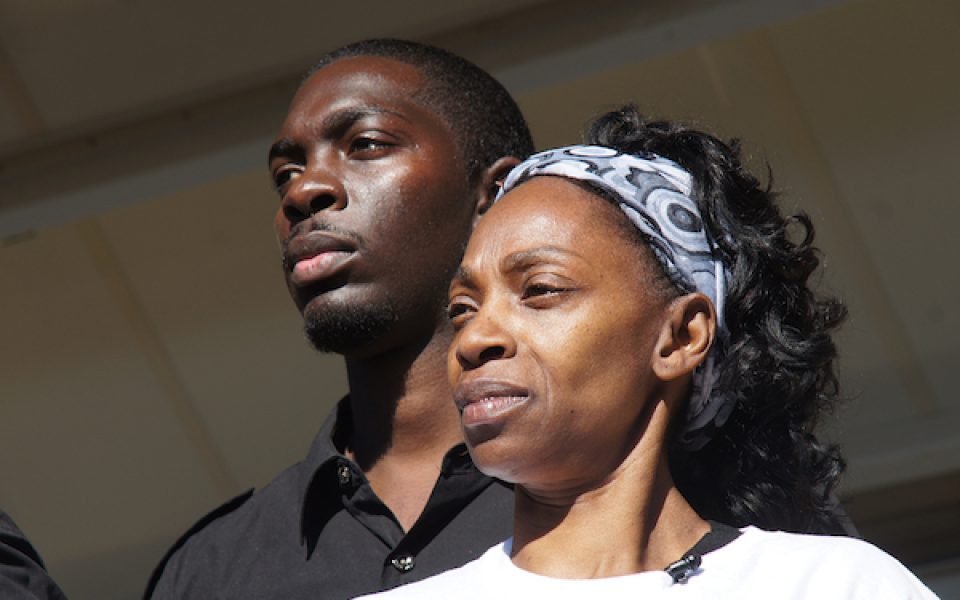Dir. Jacqueline Olive, USA, 2019, 89 min.
Some North Carolinians may remember a brief flurry of international media interest in the suspicious death of Lennon Lacy, a 17-year-old who was found hanging from a swing set in rural Bladenboro in 2014. Local police quickly declared Lacy’s death a suicide, and the US Attorney’s Office for the Eastern District of North Carolina eventually reached the same conclusion. But the circumstances of his death — the fact that he was found with someone else’s shoes on, that the police seized the local medical examiner’s camera when he was attempting to photograph the death scene, that Lacy’s grave was vandalized within days of his burial and that Lacy, a young black man, had been dating a white woman — leave the undeniable impression that he died as a result of a racially motivated murder.
In other words, a modern-day lynching.
Recalling the 1996 documentary Paradise Lost, parts of Always In Season scrape underneath the conventional news coverage of the case to suggest a plausible alternative to the official story by identifying a neighbor whose avowed racism provides a motive and whose hasty departure raises suspicions.
But beyond the true-crime element of the story, filmmaker Jacqueline Olive uses the story of Lacy’s death and his family’s quest for justice as a hook to examine the history of racial terror against African-Americans in the US South. Her unflinching yet thoughtful film poses some difficult questions: Are black and white Southerners ready to break a silence forged in fear and shame around racial violence? Is Lacy’s death a fearful reminder of an era when black people, mostly men but also women, were killed wantonly and with impunity to reinforce white supremacy, or is it a signal that the United States again hovers at the precipice of a new spasm of racial violence?
Reflecting on how murders of black men and women were carried out in public with the avid participation of ordinary white people from roughly 1890 to 1960, Sherrilyn Ifill, president of counsel for the NAACP Legal Defense and Education Fund, reflects, “Lynching was a message crime.”
Heather Rattelade, a lawyer for the North Carolina NAACP, identifies a different but chillingly parallel trend in the past 15 years.
“As I started researching black males committing suicide in public and I realized there had been almost 20 black males found hanging in public parks over just the past few years, and I realized how quickly law enforcement that responded to those scenes deemed those deaths suicides,” Rattelade says, “I became concerned that there may be a bigger surreptitious movement at play here.”
Olive’s masterful film leaves viewers with another unsettling question: Even if white racists aren’t brazenly murdering black men in gruesome public spectacles, do these purported suicides send their own message of racial intimidation to the black community that is only compounded by law enforcement indifference?
Always In Season screens on April 9 at 8 p.m. at Red Cinemas in Greensboro, and at A/perture 1 in Winston-Salem on April 10 at 4:30 p.m. and April 11 at 8 p.m.
— JG
You may also enjoy these Riverrun 2019 reviews:
Who Killed Lt. Van Dorn: This documentary dives into the mysterious death of Lt. Van Dorn, a Greensboro native who died during a training exercise off the coast of Virginia in 2014 while piloting the US Navy’s 53E helicopter.
Bei Bei: This documentary delves into the abortion debate by focusing on Bei Bei Shuai, a Chinese immigrant woman living in Indiana, who is facing two felony counts after her baby died when she committed suicide.
Find the full list of reviews here.
Join the First Amendment Society, a membership that goes directly to funding TCB‘s newsroom.
We believe that reporting can save the world.
The TCB First Amendment Society recognizes the vital role of a free, unfettered press with a bundling of local experiences designed to build community, and unique engagements with our newsroom that will help you understand, and shape, local journalism’s critical role in uplifting the people in our cities.
All revenue goes directly into the newsroom as reporters’ salaries and freelance commissions.


Leave a Reply